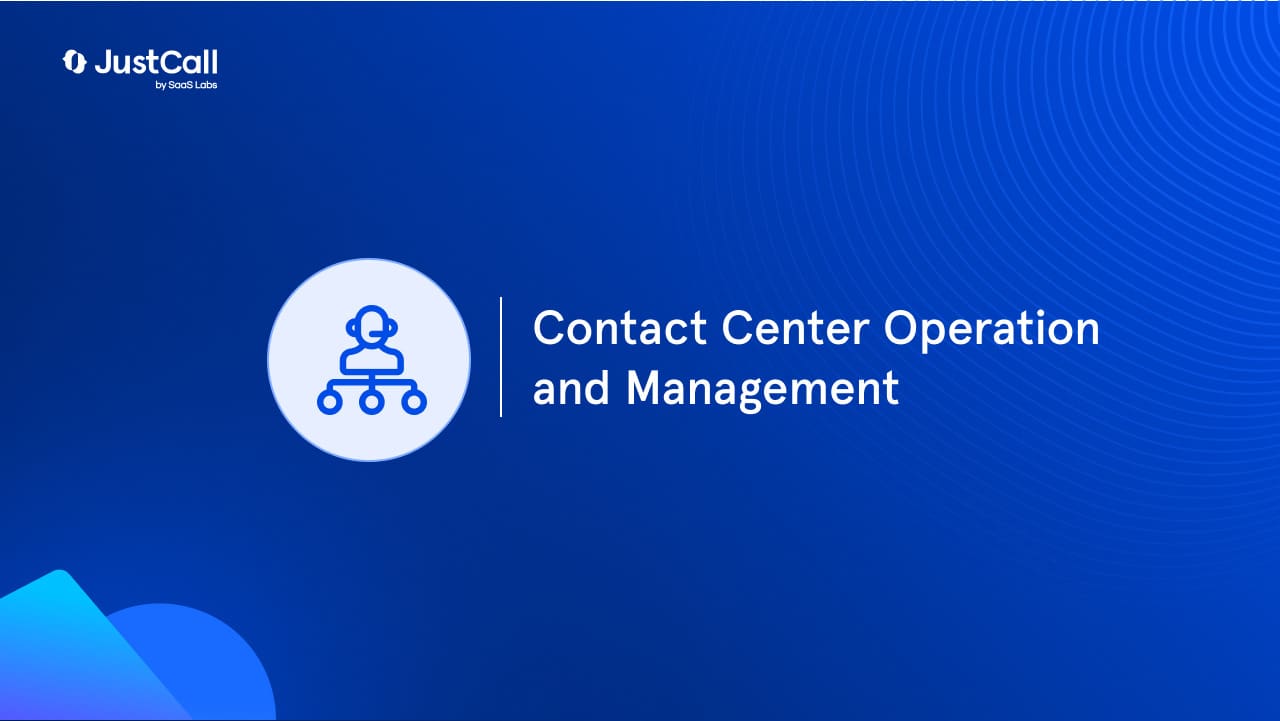Customer support is the backbone of every customer-facing business, and your growth relies heavily on your ability to satisfy and retain your customers.
But meeting the increasing expectations of your customers is a challenge. And the only way to succeed is through an effective contact center management system.
This blog will look at the tips and best practices for contact center management. Follow them to optimize your contact center operation and ensure smooth customer service.
What is Contact Center Management?
Contact center management is how managers run their contact center’s daily operations. It includes managing various activities such as employee hiring and onboarding, agent coaching and training, task scheduling, team communication, performance monitoring, etc.
Most contact centers function in a fast-paced and chaotic environment, which makes effective management crucial for success. By utilizing the right technology, managers can streamline all communication between agents and customers, making it easier for them to deliver superior customer experience.
Contact Center Management Strategies and Best Practices
Creating and implementing the right strategies is the key to effective contact center management. Below are some tips and best practices to improve your contact center operation and help you deliver top-notch customer service.
Hire the Best Staff and Train Them
Contact centers are built on dedicated agents with a genuine passion for serving customers. So while hiring new staff, look for skills such as effective communication, enthusiasm, empathy, good listening, and problem-solving apart from technical skills.
Once onboarded, empower your new staff with comprehensive training on the company’s service standards and best practices. Continuous training will equip employees with the skills needed to handle all kinds of customer complaints.
Define Individual Roles and Responsibilities
To ensure that your employees perform their best, you must define the roles and responsibilities of all. Divide the tasks between agents, supervisors, and managers so that each individual knows what is expected of them.
Here’s an example of a typical role division:
- Agent’s Role: Communicate directly to customers to resolve their issues.
- Supervisor’s Role: Train and monitor agents’ interactions and alert managers on critical issues.
- Managers’ Role: Evaluate customer expectations, monitor key performance indicators, and define agents’ and supervisors’ duties.
Such segregation of duties also helps set accountability for individual tasks.
Keep Communication Channels Open
Make a point to communicate regularly with your agents and supervisors. Since they are at the front line of customer service, they better understand what’s working and what needs improvement. Be open to their suggestions and guide them through challenges.
A great way to foster engagement is by frequently holding informal conversation sessions and happy hours. Make them feel part of the team, so they are comfortable voicing their opinions.
Ensure Optimal Task Scheduling and Proper Workflow Balance
Attending to customer inquiries back-to-back can be overwhelming and stressful for agents, ultimately affecting their quality of service. The solution to this problem is proper task scheduling.
Consider factors such as the agent’s ability and availability, peak and low hours, and time between shifts to balance workflow between agents. Ensure to give enough downtime to agents to recharge so they can offer each customer the friendly and patient service they deserve.
Track Key Performance Metrics
Metrics give insight into call center operations, help you identify trends, measure performance, and conduct quality assurance, so you can fine-tune processes and improve customer experience.
Here are some key call center metrics that you should measure.
First Contact Resolution (FCR) Rates
FCR represents the percentage of customer complaints resolved at the first point of contact with your agents. It is a good indicator of the agent’s efficiency and customer satisfaction.
Customer Satisfaction (CSAT) Rates
CSAT is the total of all scores an agent receives over a time period. Each customer is asked to rate the agent based on their interaction.
A higher score indicates that the customers are happy with the agent, while a lower score points out the need for improvement.
Net Promoter Score (NPS)
Your NPS score shows how likely your customers are to recommend your service to someone. It indicates customer loyalty and provides insight into how well agents resolve customer issues.
Average Handling Time (AHT)
AHT refers to the average time an agent takes to handle customer issues.
Generally, a low handling time indicates higher agent productivity. But if your AHT is high, it’s time to review calls and processes to determine the cause of inefficiency.
Provide Incentives for Better Performance
Performance-based incentives and rewards motivate employees to work hard. In fact, Gartner finds that recognition and reward programs can increase employee performance by more than 11%.
If you want high-performing employees to stick with your company, you must recognize their achievements. Offer them bonuses, quotas, an extra day of vacation, or other rewards so they feel appreciated and continue to give their best.
Invest in Contact Center Management Software
To efficiently manage contact center operations and stay ahead of the competition, it’s essential to invest in quality contact center management software. This software is designed to complement your team’s efforts so that you can provide superior support to your customers.
Below are some must-have software for effective contact center management.
Contact Center Email Management Software
Contact Center email management software is a tool that helps your team manage email better. It has features such as priority setting, pre-defined responses, customer context, and email analytics to reduce your teams’ workload while improving customer relationships.
Whether it’s internal communication or customer interaction, email management software enables efficient collaboration and ensures you do not miss any conversation.
Contact Center Quality Management Software
A contact center quality management software helps you ensure the quality of your service. Instead of following the old sampling method of quality tests, you can use this software to score all your customer interactions in real-time, whether call, chat, text, or social media.
This way, you know how each agent performs and show them room for improvement.
Contact Center Knowledge Management Software
A contact center knowledge management software lets you create a searchable and editable repository of all service-related information. This way, your agents can access clear and accurate answers to frequently asked questions in real time.
They even have features for intelligently guiding agents through customer inquiries. It ultimately improves the quality of support delivered, resulting in higher customer satisfaction.
Contact Center Performance Management Software
Contact center performance management software helps improve your contact center’s operational efficiency. They help measure individual and group performance against target performance so you can achieve your business goals faster.
Contact Center Operations Software
Contact center operation software automates critical contact center operations. It takes care of all contact center processes, from staffing, task scheduling, and managing customer communications to complying with laws and regulations.
Consider Managed Services For Your Contact Center
Today, many contact center businesses take advantage of contact center managed services, where they outsource their IT operations to a technology partner. The Managed Service Provider (MSP) handles your daily IT operation, allowing you to focus on your core business.
MSPs are skilled at designing, implementing, and managing your contact center technology and can help you optimize your teams’ performance. With them, you can quickly and affordably scale technological requirements up and down to meet the changing customer demands.
Experience The AI-Powered Ccaas Platform 6,000+ Customers Trust
Final Words
The above contact center management tips and best practices with help you enhance customer satisfaction and, in turn, drive your business success.
Remember, your agents are your strongest pillars. So hire the right people and empower them with continuous training and best-in-class contact center management software.












